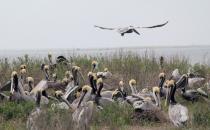Iconic southern bird at risk of losing key federal protections
Once common in the South, red-cockaded woodpeckers now number as few as 7,800 active clusters of birds. Logging and fire suppression destroyed much of the longleaf pine habitat where the woodpecker makes its home. As the number of older pines and the size of forests decreased, so did the red-cockaded woodpecker population. The bird has rebounded slightly under decades of intensive management and the protections of the Endangered Species Act, but it’s still found only in isolated pockets of the South. Now climate change is increasing the intensity and frequency of the severe storms and rising temperatures that destroy what habitat the red-cockaded woodpecker has left.
The U.S. Fish and Wildlife Service classified the rare black and white bird species as endangered in the 1970’s, due to the rapid disappearance of its habitat: longleaf pine forests that once dominated Southeastern woodlands, but have been heavily logged and cleared. The Fish and Wildlife Service has worked closely with a myriad of state and federal agencies to carefully and intensively manage red-cockaded woodpeckers since then—but the agency’s own data shows that key recovery targets still have not been achieved.
In August 2018, the agency announced a formal status review for red-cockaded woodpeckers, as required every five years under the Endangered Species Act. Despite making no announcements or releasing a final status review to the public, records show that the service is prepared to downlist the species. At the same time, the agency is asking other state and federal agencies to help make the case to remove all federal protections for the species—a move the Fish and Wildlife Service has failed to show is supported by science, as required under the Endangered Species Act.
Not only could the agency’s approach remove protections for this iconic and rare Southeastern bird while ignoring evidence, it has largely excluded the public from the process.
The red-cockaded woodpecker remains reliant on key conservation measures undertaken by state, federal, and private partners, including installing and maintaining artificial cavities and prescribed burns.
“The agency is poised to set a dangerous precedent of claiming victory too early and without scientific support, leaving this species without the management it critically needs to succeed,” says Staff Attorney Ramona McGee.
Assessments show that the bird’s habitat, already severely shrunken by development pressures, faced further blows from the major hurricanes that have hit the region in recent years. Public records also contain new information about recent severe storm impacts from hurricanes Florence and Michael, reiterating the need to maintain the species’ longstanding protections.
SELC is calling on Fish and Wildlife officials to be more transparent about the agency review process, use the best-available science, and halt the effort to downlist or delist the red-cockaded woodpecker.
To read the full letter, click here.

